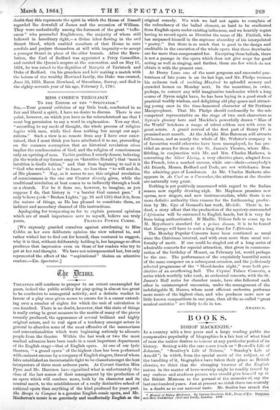MISS COBBE'S THEOLOGY.
To THE EDITOR OF THE " SPECTATOR." SIR,—Your general criticism of my little book, conducted in so fair and liberal a spirit, I have no desire to discuss. There is one point, however, on which you have so far misunderstood me that I must beg permission to say a word in explanation. You say that, "according to my mode of thought, the whole process of religion begins with man, while God does nothing but accept our aspi- rations." Such a view is so remote from any I have ever enter- tained, that I must think you have attributed it to me, proceeding on the common assumption that an historical revelation alone implies the condescension of God, and the religion of consciousness only an uprising of man. To this position I utterly demur, believing (in the words of my former essay on "Intuitive Morals") that "man's intuition is God's tuition," and that from beginning to end it is "God who worketh in us" to know, no less than "to will and do, of His pleasure." Nay, as it seems to me, this original revelation of consciousness is the one our Creator directly gives, while the traditional revelation at best conies to us indirectly through a book or a church. Far be it from me, however, to imagine, as you suppose I do, that history is " a barrier God cannot pass." I only believe (vide "Broken Lights," pp. 29 and 139) that it is, from the nature of things, as He has pleased to constitute them, an indirect and secondary channel of His instructions.
Apologizing for trespassing so far to explain personal opinions which are of small importance save to myself, believe me truly
[We expressly guarded ourselves against attributing to Miss Cobbe as her own deliberate opinion the view referred to, and rather wished her to find out for herself, than ventured to suggest, why it is that, without deliberately holding it, her language so often produces that impression even on those of her readers who try to get at her real thought. We have not misrepresented her, but only represented the effect of the " aspirational" theism on attentive readers.—ED. Spectator.]






























 Previous page
Previous page